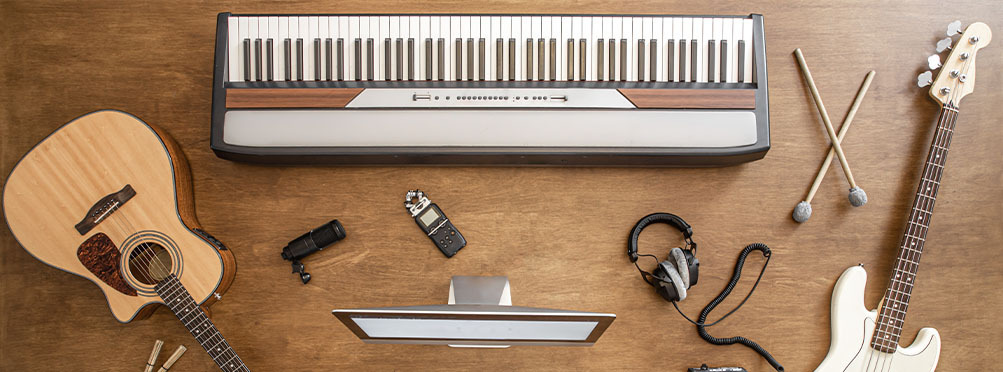Blog
“How to Choose the Perfect Instrument for Your Style”
Choosing the right musical instrument is a deeply personal decision that can significantly shape your musical journey. Whether you’re a complete beginner or an experienced musician looking to branch out, finding the perfect instrument that complements your style and goals is crucial. Every instrument has its unique qualities and challenges, and choosing one that aligns with your musical preferences can help keep you motivated and inspired. In this guide, we’ll explore how to select the right instrument based on your musical style, preferences, and personal needs.
1. Understand Your Musical Interests
Before diving into the specifics of different instruments, it’s important to first consider the type of music you enjoy. Your musical style and the genres that resonate with you can offer great insight into which instruments are best suited to your tastes.
Genre Preferences
Different genres tend to favor certain instruments, so identifying your preferred genre can help narrow down your options:
- Rock & Pop: Electric guitars, bass guitars, and drums are essential in rock and pop music. The electric guitar, in particular, plays a key role in these genres due to its versatility and iconic sound.
- Classical: If you are drawn to classical music, you might prefer string instruments such as the violin, cello, or double bass, or keyboard instruments like the piano or organ. Orchestral instruments like the flute and clarinet are also integral to classical compositions.
- Jazz: Jazz musicians often gravitate towards wind instruments (trumpet, saxophone, trombone), as well as piano and bass. Percussion, such as the drums and the vibraphone, is also important in jazz ensembles.
- Folk and Country: Acoustic guitar, banjo, mandolin, and harmonica are commonly used in folk and country music, offering a rich, earthy sound.
- Electronic and Dance Music: Synthesizers and drum machines dominate electronic music. For those interested in producing beats and experimenting with sounds, a MIDI controller or electronic drum kit might be the way to go.
Identifying the genre you’re most interested in can help you choose an instrument that aligns with the sound you’re aiming to create.
2. Consider Your Personality and Learning Style
Your personal preferences and learning style can also influence which instrument is right for you. Some instruments are easier to pick up and play right away, while others require more time and effort to master.

Are You Patient and Dedicated?
Some instruments require a lot of practice to produce a good sound, and others are more beginner-friendly. If you’re the type of person who enjoys long hours of practice, you might be ready for a more challenging instrument like the violin or piano, where consistent practice leads to steady improvement.
Do You Prefer Instant Gratification?
If you enjoy playing songs quickly and don’t mind a more casual approach to learning, instruments like the ukulele or acoustic guitar might be perfect for you. Both instruments offer relatively simple chords that can allow you to play a variety of songs early on.
Physical Considerations
Certain instruments are physically demanding, requiring good coordination, finger strength, and endurance. For instance, brass and woodwind instruments, such as the trumpet or clarinet, require breath control and embouchure (mouth positioning), while string instruments like the violin or guitar demand dexterity and finger strength. Consider your physical comfort when choosing an instrument, especially if you’re thinking long-term.
3. Budget and Affordability
Budget is another key factor in selecting the perfect instrument for you. Some instruments are more affordable to begin with, while others may require a significant investment for a quality instrument.
Low-Cost Entry-Level Instruments
- Ukulele: Ukuleles are small, affordable, and easy to learn, making them a great starting point for beginners.
- Recorder: Often used in schools, the recorder is a very budget-friendly option for learning basic music concepts and getting started with wind instruments.
- Keyboard: While high-end pianos can be expensive, digital keyboards are an affordable alternative that can still offer a rich range of sounds and are easy to practice on.
- Acoustic Guitar: Entry-level guitars are relatively inexpensive, making them an excellent choice for those looking to start learning string instruments.
Higher-End Instruments
- Piano: A traditional acoustic piano can be costly, though digital pianos and keyboards are more affordable alternatives.
- Violin and Cello: These instruments can range widely in price, but high-quality violins and cellos can be quite expensive.
- Brass Instruments: Trumpets, trombones, and other brass instruments can also be on the pricier side, especially for beginner models of good quality.
If budget is a concern, consider looking for second-hand instruments or exploring rental options to avoid a hefty upfront cost.
4. Portability and Practicality
Some instruments are more portable than others, which is an important factor to consider if you plan to take your music on the go or perform with others. Instruments like the ukulele, harmonica, and flute are easy to carry around, while larger instruments like the piano, double bass, and drum kits may require more space and are harder to transport.
If you plan to practice in various settings or perform in different locations, portability might be a high priority. Smaller instruments offer the flexibility to travel and practice wherever you go, while larger instruments may be better suited for at-home use or professional performances.
5. Think About Long-Term Growth
While it’s tempting to choose an instrument based on immediate interest, it’s important to think about your long-term goals as a musician. Consider how the instrument you choose will grow with you as you advance in skill. Some instruments offer more opportunities for progression and skill development than others.

Instruments with More Depth and Complexity
- Piano: The piano offers endless possibilities for musicians to grow, from classical to jazz to contemporary music. Learning the piano gives you a strong foundation in music theory, which can help you with other instruments as well.
- Guitar: As you advance, you can explore more complex techniques such as fingerpicking, soloing, and music theory related to the guitar. The guitar’s versatility makes it a great instrument for lifelong learning.
- Violin: While difficult to master, the violin offers great rewards for long-term musicianship, allowing you to perform in a wide variety of musical genres, from classical to folk.
6. Find the Right Community
Finally, it’s important to consider the community and opportunities for collaboration that come with your instrument. Some instruments lend themselves more easily to group play or ensemble performances, while others are often played solo.
- Guitar, Drums, and Piano: These instruments are frequently used in bands, ensembles, or orchestras, making them ideal for collaborative musicianship.
- String Instruments and Brass: If you are interested in performing with an orchestra or chamber music groups, instruments like the violin, cello, trumpet, and clarinet will provide many opportunities for ensemble performances.
- Electronic Instruments: If you’re interested in electronic music production, you may prefer instruments like synthesizers, drum machines, or MIDI controllers that allow you to create music and collaborate with others in a digital format.
Conclusion
Choosing the perfect instrument is a personal decision that depends on your interests, personality, budget, and long-term goals. Whether you’re drawn to the energetic strumming of a guitar, the elegant sound of the piano, or the intricate rhythms of drums, the right instrument can provide a lifetime of musical enjoyment and growth. By considering your musical style, physical preferences, and budget, you can select an instrument that will not only suit your current abilities but also help you develop as a musician in the years to come. Happy playing!


